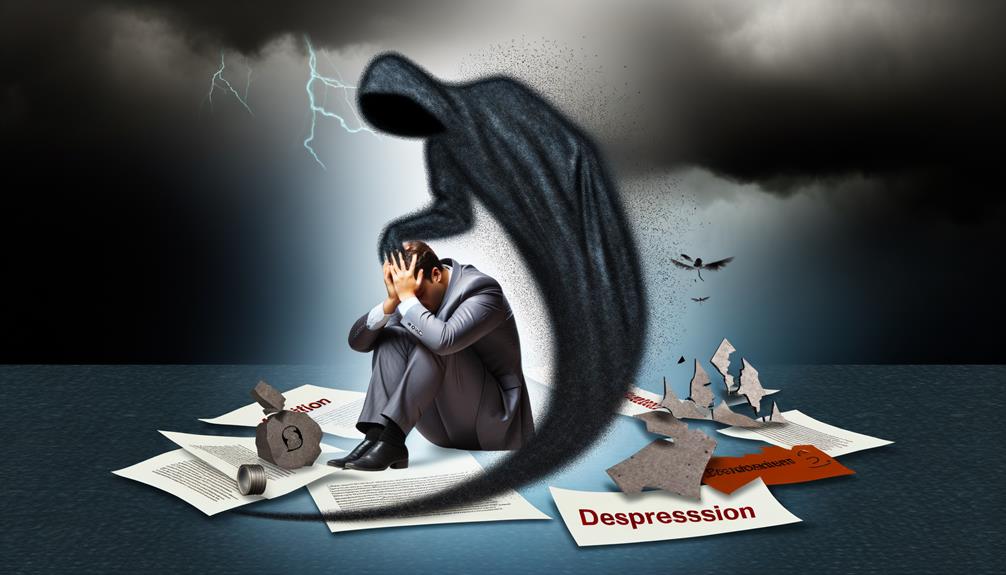When discussing whether Satan causes depression, you can't ignore the intricate blend of spiritual and mental health perspectives. Some believe depression is a spiritual battle, where Satan exploits human vulnerabilities to induce despair. Biblical teachings often highlight the importance of recognizing these spiritual influences, suggesting that prayer and community support are vital defenses. However, while the spiritual angle is compelling, it's equally important to take into account professional mental health care in addressing this complex issue. So, how do you reconcile these differing viewpoints and find a balanced approach to dealing with depression?
Contents
Defining Depression
In defining depression, it is vital to understand that it isn't just a fleeting feeling of sadness but a pervasive state of general unhappiness, low spirit, and profound despair. As a mental illness, depression transcends mere emotional distress, embedding itself deeply within one's psyche and daily existence. You're not simply experiencing a bad day; rather, you're enveloped in a continuous cycle of pain and suffering that can be triggered by a myriad of factors. Traumatic life events, chemical imbalances, and even prolonged isolation can serve as catalysts for this debilitating condition.
Depression often manifests through persistent feelings of despair and hopelessness, distorting your perception of reality and making even simple tasks feel insurmountable. This isn't a temporary setback but a long-lasting state that can erode your sense of self and purpose. Recognizing the cyclical nature of depression is essential, as it can create a self-perpetuating loop of negative thoughts and emotions. You're trapped in a cycle where each bout of despair feeds into the next, making it increasingly challenging to find a way out.
Moreover, the signs of depression are multifaceted and often interwoven with other emotions like grief, anger, and guilt. These feelings can be exacerbated by external influences such as societal pressures or personal relationships, further intensifying your mental pain and suffering. Understanding depression, consequently, requires an extensive approach that considers both the external life circumstances and internal biological factors contributing to this mental illness. Only by acknowledging its complexity can you begin to grasp the profound impact depression has on one's overall well-being.
Impact on Life

Beyond the immediate emotional turmoil, the impact of depression on daily life can be profoundly debilitating. When you believe that Satan uses depression as a tactic to sow despair and hopelessness, it can greatly affect your mental health. This perception often leads to a vicious cycle of heightened emotional and spiritual struggles. You may find yourself grappling with increased guilt and a sense of isolation, which can further exacerbate depressive symptoms.
Viewing depression as a spiritual battle might prevent you from seeking the professional help necessary to manage your condition effectively. The stigma associated with demonic influence can lead to prolonged suffering, as the belief that depression is a result of spiritual weakness may discourage you from acknowledging the need for medical or psychological intervention. This can create a barrier to accessing the full spectrum of mental health resources that could facilitate recovery.
However, the concept of spiritual warfare also offers a potential pathway to resilience. Recognizing and resisting what you perceive as Satan's influence might empower you to take proactive steps towards reclaiming your mental health. This approach can foster a sense of agency and determination, which are essential elements in combating depression.
Community support and prayer play an integral role in this situation. When you engage with a supportive community, you combat the feelings of isolation and despair that often accompany depression. Knowing that you're not alone in your struggles can provide comfort and strength, reinforcing the idea that collective resilience can be a powerful tool against mental health challenges. As a result, while the spiritual framing of depression presents unique challenges, it also offers distinctive avenues for support and recovery.
Faith and Recovery

Faith can serve as a cornerstone in your journey towards recovering from depression, providing a profound sense of purpose and connection to a higher power. For many, faith acts as a powerful source of strength and hope, anchoring them during tumultuous times. Engaging in prayer and various spiritual practices can alleviate feelings of isolation and despair, creating a supportive environment conducive to healing.
Integrating faith with professional mental health treatment often results in a more thorough recovery approach. This synergy addresses both spiritual and psychological needs, which can be essential for holistic healing. When you combine therapy with your faith, you're not just treating symptoms; you're nurturing your soul. This dual approach can lead to more sustainable mental health improvements.
Community support is another significant benefit of faith-based recovery. Faith-based groups provide a platform for open discussions about struggles with depression, promoting empathy and collective healing. When you're surrounded by individuals who share your beliefs and understand your struggles, it can foster a sense of belonging and reduce the stigma often associated with mental health issues.
The belief in divine intervention and the power of scripture can also empower you to combat negative thoughts and feelings. Scriptures often contain messages of hope, resilience, and encouragement, which can be incredibly motivating during your recovery journey. This spiritual reinforcement can bolster your mental resilience, making it easier to navigate the challenges of depression.
Spiritual Warfare

Recognizing faith's role in your recovery journey opens the door to understanding the deeper, often unseen battles associated with depression. These battles are not just psychological or physical but are rooted in what is termed spiritual warfare. This concept suggests that depression can be a tactic employed by Satan to instill despair and hopelessness, aiming to disrupt your faith and well-being.
Ephesians 6:12 underscores that our struggle is not against flesh and blood but against spiritual forces of evil. Understanding this helps you remain vigilant and prepared, knowing that depression might be a manifestation of these spiritual skirmishes. To effectively counteract these depressive states, it's essential to recognize the enemy's tactics, as advised in 1 Peter 5:8, which calls for alertness and readiness.
To combat these unseen forces, you can:
- Engage in prayer and scripture reading: Verses like Romans 8:1 remind you of God's love and acceptance, fortifying your spiritual defenses.
- Utilize the Armor of God: Ephesians 6:13-17 outlines spiritual tools such as truth, righteousness, and faith to stand firm against attacks.
- Stay connected with a faith community: Fellowship provides support and encouragement, helping to combat isolation.
- Meditate on the Word of God: Regular meditation reinforces spiritual truths and counters negative thoughts.
- Seek pastoral counseling: Spiritual leaders can offer guidance and prayer support, reinforcing your spiritual resilience.
Biblical Insights

In examining biblical insights, you'll find that figures like King David and Jesus faced profound emotional struggles, often linked to spiritual warfare. These accounts illustrate that mental anguish can be intertwined with demonic influence, as seen in Paul's warnings about spiritual battles in Ephesians 6:12. Scriptures like 1 Peter 5:8 urge vigilance against Satan's schemes, suggesting that recognizing his tactics can be essential in addressing depression.
Biblical Figures' Struggles
Amid the rich tapestry of biblical narratives, the profound emotional struggles of key figures offer deep insights into the human condition and spiritual life. From King David's poignant Psalms to Jesus' agony in the Garden of Gethsemane, the Bible doesn't shy away from depicting depression and mental anguish, even among the most devout.
Consider the following:
- King David: His cries in Psalms reveal a heart weighed down by despair, demonstrating that closeness to God doesn't shield one from depression (Psalm 6:2-6; Psalm 13:1-3).
- Jesus: His sorrow in Gethsemane underscores that even the Son of God faced profound mental distress (Matthew 26:38-39; Luke 22:44).
- Judas Iscariot: His overwhelming guilt and subsequent suicide highlight the destructive power of hopelessness (Matthew 27:1-5).
- Demon-possessed man: In Mark 5:6-9, the extreme torment he experiences illustrates spiritual oppression manifesting as severe psychological pain.
- Compassion: The narratives call for compassion toward those battling depression, as exemplified by the emotional struggles of these figures.
These stories underscore that depression is a profound, multifaceted experience. They remind you that even within the biblical context, mental anguish is a significant part of the human journey, warranting empathy and understanding.
Spiritual Warfare Insights
While the emotional struggles of biblical figures provide a poignant look at depression, the concept of spiritual warfare offers another layer of understanding. Ephesians 6:12 emphasizes that our battle isn't against flesh and blood but against spiritual forces. This suggests that some feelings of depression might stem from demonic attacks.
In 1 Peter 5:8, Satan is described as a "roaring lion" seeking to devour, potentially leading you into despair and hopelessness. John 10:10 reinforces this, showing Satan's intent to steal, kill, and destroy, often through mental anguish, including depression. Spiritual warfare encompasses the idea that guilt, shame, and despair can be influenced by demonic forces, making the struggle with depression even more significant.
| Scripture | Insight |
|---|---|
| Ephesians 6:12 | Battle against spiritual forces |
| 1 Peter 5:8 | Satan seeks to devour, leading to despair |
| John 10:10 | Satan's intent to steal, kill, and destroy |
Prayer and scriptural affirmation are essential tools in combating these spiritual attacks. They provide the strength to resist oppressive thoughts. If you find yourself overwhelmed, it's important to seek help, utilizing both spiritual and professional resources. Understanding spiritual warfare can empower you to confront and mitigate the forces that exacerbate depression.
Scriptures on Mental Anguish
The Scriptures provide profound insights into mental anguish, revealing that these experiences are both acute and universal. Biblical accounts, from the Psalms to the Gospels, illustrate the raw depths of human sorrow and despair. When you feel like you've become depressed, these passages offer both empathy and guidance.
- King David's Lament: In Psalms 6:2-6 and 13:1-3, David's cries of sorrow show that feeling overwhelmed by anguish is acknowledged by God.
- Jesus' Agony: In Matthew 26:38, Jesus' profound distress in Gethsemane ("My soul is sorrowful, even unto death") highlights that even the divine endured such torment.
- Job's Despair: The book of Job, particularly in chapters 3:11-12, explores severe suffering, questioning existence, and illustrating the depth of human pain.
- Physical Manifestation: Luke 22:44 describes Jesus sweating drops of blood, underscoring the physical toll of extreme emotional distress.
- Divine Support: In 1 Peter 5:7, God says to "cast all your anxieties on Him," emphasizing the importance of seeking divine assistance during times of mental anguish.
These scriptures not only validate your experiences but also offer a path for seeking solace and support from God.
Support Systems

In addressing depression, support systems are indispensable, offering both community encouragement initiatives and peer support networks that create a nurturing environment for those in distress. Faith-based counseling resources further enrich these networks by integrating spiritual guidance with mental health practices, enhancing resilience and a sense of belonging. Engaging in such extensive support structures, combined with professional help, can notably mitigate the isolating effects of depression and promote holistic healing.
Community Encouragement Initiatives
Amid the labyrinthine struggles of depression, community encouragement initiatives serve as essential support systems that can greatly reduce feelings of isolation. When you're battling mental health issues, akin to physical illness, having a supportive community can be a lifeline. These initiatives foster environments where you feel safe to share your struggles, mitigating the isolating nature of depression.
Community encouragement manifests in various forms:
- Support groups: These provide a platform for mutual encouragement and sharing personal mental health experiences.
- Volunteer opportunities: Engaging in community service can uplift your spirits by creating a sense of purpose and connection to others.
- Educational workshops: Workshops focusing on mental health can demystify depression and promote understanding, enabling the community to offer more effective support.
- Faith-based gatherings: Regular prayer meetings and collective worship can strengthen community bonds and offer spiritual reinforcement.
- Group activities: Participating in group activities can provide a shared space for encouragement and support.
Faith-Based Counseling Resources
While community encouragement initiatives form an essential support network, faith-based counseling resources bring an additional layer of solace and guidance. By integrating spiritual practices like prayer and scripture study from the New Covenant, these resources provide a unique approach to addressing mental health challenges, including depression. Faith-based counseling centers often create environments that recognize the intrinsic link between spiritual well-being and mental health, thereby promoting holistic healing.
Accessing faith-based counseling resources means you're not just receiving traditional psychological support but also spiritual nourishment. Professional Christian counselors often blend biblical principles with psychological techniques, ensuring a dual approach to recovery. This method helps you build resilience by fostering a sense of community through shared beliefs and collective prayer.
Moreover, faith-based initiatives within church groups can greatly alleviate feelings of isolation. The New Covenant emphasizes the power of community and shared experiences, which can be immensely comforting when you're struggling with depression. By participating in these faith-based support systems, you can find emotional encouragement and a sense of belonging. Ultimately, the integration of spiritual and mental health support can offer a thorough pathway to healing and resilience.
Peer Support Networks
Peer support networks stand as essential pillars in the landscape of mental health support, particularly for those grappling with depression. They provide a safe space for individuals to share their feelings and struggles, fostering a sense of belonging and understanding. People don't even realize how much these networks can reduce feelings of isolation, as participants come to see they are not alone in their experiences.
Engaging with peers who have similar experiences offers practical advice and shared coping strategies that might not be accessible through traditional therapy. Research shows that peer support can greatly improve recovery outcomes and overall mental well-being by promoting resilience and hope among participants. Many peer support groups also incorporate faith-based elements, allowing you to find strength and encouragement through shared beliefs and spiritual practices.
Consider the following benefits of peer support networks:
- Safe Space: You can openly share your struggles without judgment.
- Reduced Isolation: Realize you're not alone in your experiences.
- Practical Advice: Gain actionable coping strategies from peers.
- Enhanced Recovery: Improve mental well-being and resilience.
- Faith Integration: Draw strength from shared beliefs, saying, "Lord my God, grant me peace."
Peer support networks are invaluable in your journey toward mental health, combining empathy, community, and faith.
Conclusion
In understanding depression, it is vital to integrate spiritual beliefs with professional mental health practices. While some interpret depression as a spiritual battle involving Satan's influence, it is important to also acknowledge the significance of medical treatment and support systems. Biblical teachings encourage prayer and community, but don't neglect the requirement of professional care. By harmonizing faith and mental health resources, individuals can pursue a more thorough path to recovery and resilience.
